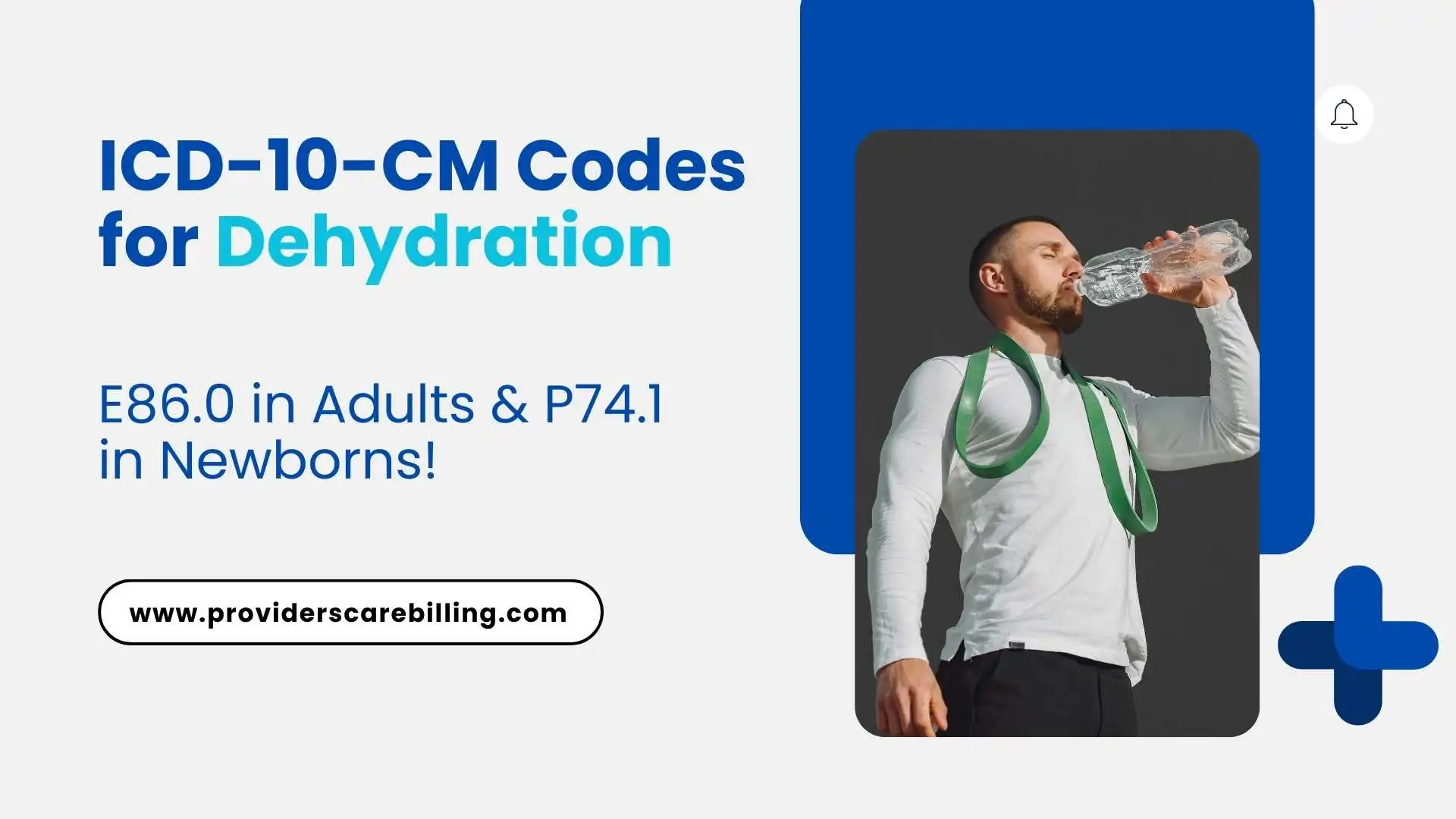“Your Patient Is Severely Dehydrated—Which ICD‑10 Code Do You Use?”
Can you imagine a hot July day when an old patient walks into your clinic dizzy and confused? Their skins are dry, their blood pressure is low, and the lab examinations show electrolyte imbalances. You quickly start some IV fluids and put down the main diagnosis, but do you code E86.0 to general dehydration or whatever?
As a healthcare professional working in radiology, urgent care, or pediatrics, precise ICD-10 codes prevent claim denials, accelerate payment, and show that you are a good steward of healthcare. The guide makes you certain that you select E86.0, treat newborn dehydration with P74.1, and register successfully to gain the best compliance.
What Is E86.0? Understanding the Dehydration ICD 10 Code
The International Classification of Diseases, the 10th revision (ICD-10) code of dehydration is E86.0. The given code is applied when it comes to classifying any case of dehydration caused by any factor, whether this case can be referred to as acute or chronic.
It should be mentioned that, according to this code, no information about the severity of dehydration and the reason for its appearance is provided. Consequently, medical practitioners have to use other diagnostic methods and evaluations in order to be able to state the exact level of dehydration as well as its cause in any patient.
Thus, it can be necessary to use more codes to describe the patient’s condition and medical history in detail. The accuracy of documentation and the assigning of the right codes are important aspects of healthcare professionals giving the right treatment and billing process.
ICD Dehydration Code Variants You Should Know
You may encounter the following variations in coding depending on the intensity and context:
| ICD Code | Description |
| E86.0 | Dehydration (default code) |
| E86 | Volume depletion (category header) |
| R55 | Dizziness (which is commonly associated with dehydration) |
| O26.891 | Pregnancy dehydration (trimester-specific ICD-10-CM codes are available). |
| E86.9 | Volume depletion, unspecified |
How One Wrong Dehydration ICD Code Delayed Reimbursements
A small children’s school in Florida clinic practice was continually using the code volume depletion, unspecified (E86.9), to report all visits for dehydration. However, only with time, 30 percent of such claims were sent back as a result of not being specific, which resulted in delayed payment for months.
Upon engaging the services of a medical billing firm, their rate of reimbursement increased tremendously. Why? The medical coding services made clear the nature of which dehydration ICD-10 code to adopt, depending on the severity of such cases and their clinical note.
Supporting Dehydration Diagnosis Code e86 0
In order to code dehydration correctly, the following points should be documented:
- Percentage loss of fluid
- Na, K Electrolytic imbalance
- Symptoms: dry mucous, low blood pressure, and confusion
- The diagnosis code activated in ICD 10 CM could be affected by the term onset of the dehydration (acute/chronic).
- Cause: vomiting, diarrhea, heat, infection
- Management: fluids IV, Electrolyte Correction for severe dehydration.
Pro Tip: particularly making reference to the lab results and vitals will support the diagnosis code of dehydration (E86.0).
Dehydration ICD-10 Codes for Pregnancy, Children, and the Elderly
1. Pregnancy Dehydration
Use:
- O26.891—Dehydration during the first trimester of one
- O26.892—2nd trimester
- O26.893—third trimester
Medically indicated: always combine with E86.0.
2. Pediatric Patients
Watch for:
- Percent change in weight loss
- Symptoms such as sunken eyes and dry diapers
- Code with codes of gastroenteritis or fever in case of relevance
3. Geriatric Patients
In long-term care, the aged patient can undergo a chronic state of dehydration. It may be helpful to write about associated conditions like dementia, kidney problems, or movement difficulty.
Pairing the Right CPT with ICD-10 Dehydration Codes (E86.0)
Apply the dehydration codes of diagnosis with the accurate CPT codes of services provided.
| Service | Suggested CPT Codes |
| Hydration therapy (IV) | 96360, 96361 |
| Emergency visit | 99281–99285 |
| Outpatient evaluation | 99202–99215 |
Acute vs. Chronic Dehydration ICD 10: What’s the Coding Difference?
Dehydration may be either acute or chronic, and although both may be coded under ICD-10 code E86.0, the situation and the report do vary. Acute dehydration ICD 10 is established when there is a sudden reduction of fluid due to some reason, such as vomiting, diarrhea, fever, or excessive sweating, and it usually requires emergency treatment, such as intravenous fluid replacement.
On the other hand, chronic dehydration takes time and mostly affects elderly patients, mobility-challenged patients, or patients having long-term ailments such as kidney disease, diabetes, etc. It is noteworthy that although these two conditions are characterized by the utilization of identical dehydration ICD 10-CM codes in their documentation, one should realize that it is crucial to explicitly mention in their documentation that either of these two conditions is acute or chronic.
Accurate ICD-10 coding is essential across all specialties—from dehydration to orthopedic complaints. See our detailed article on ICD-10 Code M25.562 for Left Knee Pain to code musculoskeletal issues effectively.
Ready for flawless dehydration coding and fewer claim delays?
Contact Providers Care Billing LLC today for expert credentialing, RCM services, and accurate ICD-10 coding—and start maximizing your revenue.
📞 Call Now: 888-495-3786
📧 Email: Info@providerscarebilling.com
Final Thoughts:
Specific coding of dehydration is more complicated than just selecting E86.0. Regardless of whether dehydration is general in adults or a newborn (P74.1), the correct codes will result in compliant documentation, on-time reimbursement, and fewer denials. The important step is to understand when to apply P74.1 and E86.0 to older patients as opposed to the application of P74.1 to infants. As well as the capture of electrolyte imbalances (E87.-) and comprehensive clinical descriptions.
A competent Medical Billing Company like Providers Care Billing LLC is one that may offer services like medical coding services and revenue cycle management services in a way that your practice may get reimbursed at the right amounts with minimal load to the collection of administrative overheads, but at the same time be within the compliant sector.
FAQs
- Is E86.0 different from E86.9?
Yes. E86.0 is specific to dehydration, whereas E86.9 is imprecise, non-specific care for volume depletion. Where an E86.0 could be used, use it.
- What does acute dehydration ICD 10 refer to?
It is nothing more than instant-onset dehydration: still coded using E86.0, though mentioning that it is acute.
- What is the code for dehydration during pregnancy?
Where a trimester code exists, such as O26.891 (first trimester) with E86.0, these should be used depending on the severity and supporting documentation of seriousness.




